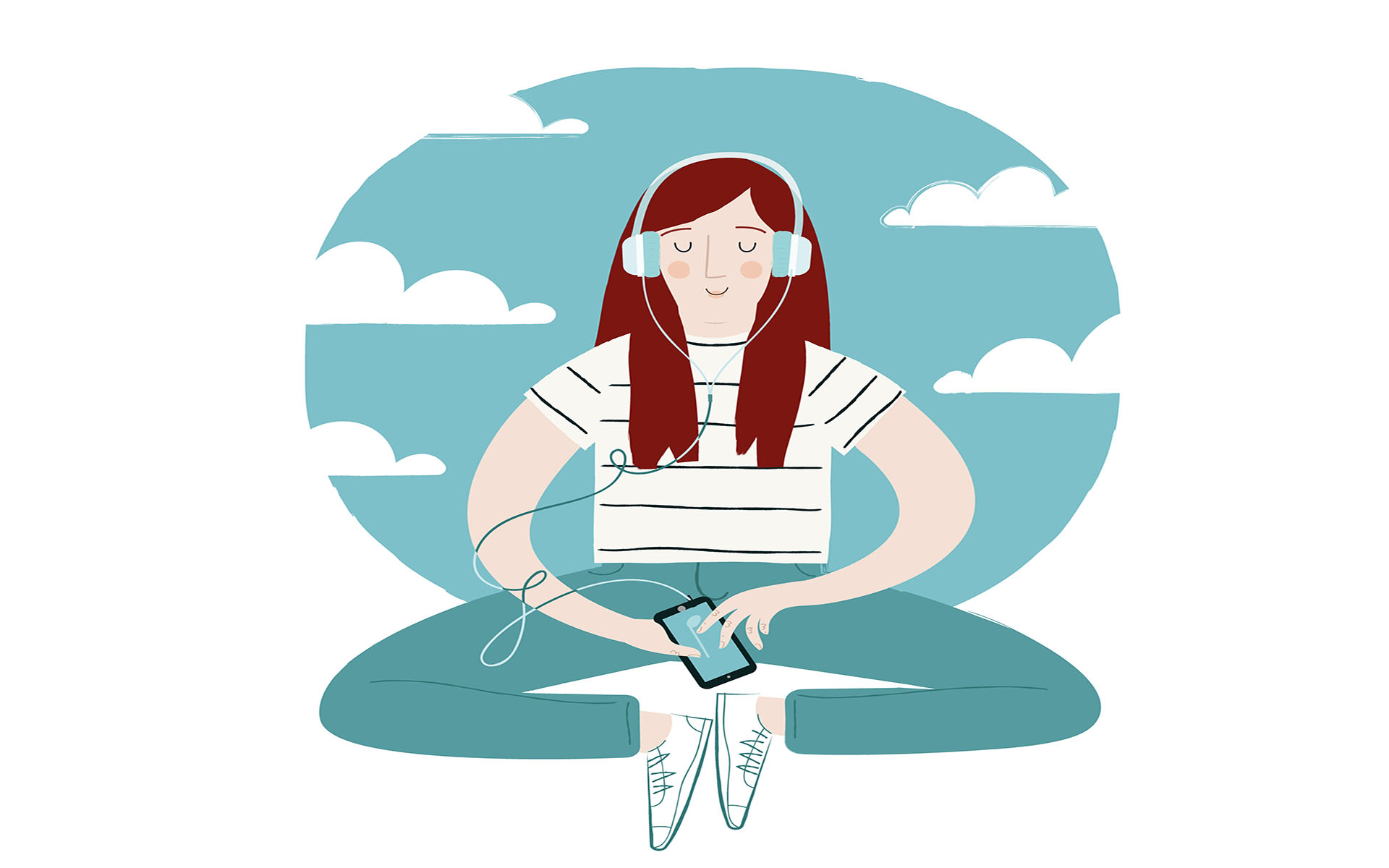I was in my late 20s when I discovered the practice of mindfulness. Years of anxiety and depression had left me exhausted and lacking confidence in my ability to navigate the basics of adult life, but an eight-week mindfulness program was a turning point. My symptoms didn’t disappear, but I learned how to ride the waves of my emotions while tapping into a deeper calm within myself.
When marriage and kids rolled around, meditation went out the window, along with sleep, intelligent conversation, and a clean house. As my children grew older and I could do more self-care, I felt conflicted about how to use my time. Do I shower? Go for a walk? See a friend? Meditation was one item in a long list of things I needed to do to address my mental health.
Well-Being Is More Than Just Meditation
In the past two decades, the science of well-being has grown. We know that “flourishing” (defined as a combination of physical, emotional, and mental health) is a state of mind where life feels good. Flourishing is not about perfection or being happy all the time, but a recognition that when we have purpose, meaning, and connection in our lives, getting out of bed every morning is easier. Life is short. We want to be fully alive and embracing every moment, even when those moments are difficult.
Most people would agree that nothing has been more challenging than living through the COVID-19 pandemic. As we churn through the frustrating cycle of opening up and then re-tightening COVID restrictions in the face of dangerous new variants, we may also be facing longer-term mental health impacts. For many, anxiety over returning to jobs, busy schedules, and socializing has been challenging to manage when we’re already so depleted. Recently, I stumbled across the Healthy Minds Program, a free app that’s designed to help users develop skills in the pursuit of well-being. Drawing from the work of scientists at the Center for Healthy Minds at the University of Wisconsin–Madison, the app is based on research that identifies four pillars of well-being: awareness, connection, insight, and purpose. Curious, I downloaded the app and set out to try it for 30 days to discover whether I could learn the skills to flourish in my own life.
Mindfulness Is a Starting Point
The app begins with a questionnaire that generates a personal score for each dimension. Aware- ness measures things like mindfulness; connection looks at my ability to form and maintain relationships, as well as show empathy and compassion; the insight score captures things like self-knowledge and resilience; and purpose gains a sense of my values, and how I integrate them into my everyday life.
“If you want to cultivate loving-kindness and compassion, examine experience and insight, or align yourself toward your values and a deeper sense of purpose—all of that really presupposes that you have a sense of awareness and present-moment mindfulness,” says Cortland Dahl, one of the research scientists who developed the app at the Center for Healthy Minds. This emphasizes that mindfulness is more than the popular idea of sitting still and quieting the mind—mindfulness helps us develop a set of skills that we can apply in everyday life, skills that will reduce stress and improve mental health.
I started with the Foundations program, which introduced me to each of the four themes. Two practices teach the basics of sitting and active meditation, and there is a brief podcast-style lesson about the science behind training in well-being, narrated by Cortland Dahl and by Dr. Richard Davidson, founder and director of the Center for Healthy Minds, who’s widely known for his work studying the neuroscience of emotion (affective neuroscience). Other meditation practices touch on things like relationships, inquiry into beliefs or assumptions, and how a sense of purpose can make life more meaningful. Practices are followed by mini science lessons, covering topics related to the app’s themes.
Although a daily practice is encouraged, users are welcome to set their own pace, and the app tracks your progress. Foundations is followed by longer programs on the skills of awareness, purpose, compassion, and insight. Users can also choose stand-alone meditations with titles like “Calm in the Midst of Chaos” or “Our Common Humanity.”
Unlearning Myths About Meditation
Within a few days of using the app, I became aware of long-held myths that I believed about meditation and mindfulness—myths that, unknown to me, were getting in the way of flourishing. The soothing voice of Cortland Dahl (or “Cort,” as he referred to himself) reminded me that I wasn’t required to do this perfectly—in fact, there was no ideal way to meditate. All I had to do was show up and become aware of what was going on in my body and mind.
The stricter practices that I’d previously followed fed into my perfectionism, and when I achieved anything less (for example, sitting for 20 instead of 45 minutes), I felt like I had failed. It was an all-or-nothing approach, because I gave up unless I was doing it “right.” The app turned these beliefs on their head, and some days I defined success as a five-minute practice while walking the dog. Most of my sitting practices were done in my bedroom, with screaming kids outside the door. It was far from serene.
Another “aha” moment came when I realized that I’d always understood well-being to be a fleeting experience over which I had little control. “The science of training the mind is all based on the idea of neuroplasticity: a fancy term that basically just means that the brain is constantly changing in response to experience,” Davidson tells me in one of the app’s lessons. “Usually the forces around us are driving these changes, but when we train our minds we’re in the driver’s seat.”
At the end of the 30 days, I had logged six hours of practice time and two hours of learning. My follow-up report showed that my connection score stayed the same, while both awareness and purpose improved. My biggest jump was in the dimension of insight, highlighting a new-found ability to be more flexible and adaptable in the face of challenges.
Digital therapeutics like apps are promising tools in a world where so many people are struggling with their mental health. Long wait times and costly therapies make it difficult for some individuals to receive the care they need. Research is emerging on the effectiveness of the Healthy Minds app, although thus far it’s been conducted by the app’s creators. Even so, preliminary results are promising, with those randomized to the app (compared to those in a waitlist control group) showing larger improvements in recovering from distress, social connectedness, and mindfulness.
“Take a look around you,” he said. “What would you notice if this was your last day on earth, or maybe even your last minute?”
As I glanced up a large blue crane swooped low overhead, a startling sight in my sleepy suburban neighborhood. A magnolia tree bloomed, the colors brilliant against the pewter sky. I took a deep breath, sending out thanks for the beauty of this world, for my place in it all.
As the narrator concluded, he reminded me that life is fragile. Shifting our perspective to the present moment reminds us how quickly things can change, and this wisdom, too, is a key to flourishing. “Moments become minutes, then hours, then days; and eventually a lifetime,” says Dahl. “Every moment provides a new opportunity to connect with a deep sense of purpose and meaning.”
READ MORE
Can Anyone Improve Their Own Well-Being?
Research from the Center for Healthy Minds is addressing the recent decline in well-being by proposing a training-based framework for “the cultivation of human flourishing.”
Read More
6 Meditation Apps That Are Worth the Price Tag
Thinking about signing up for a subscription-based mindfulness experience? Here are our four favorite premium mindfulness apps to consider—plus, two extra self-care apps that caught our attention.
Read More
Free Meditation Apps Worthy of Your Attention
Mindfulness apps are trending in a big way. Here are five we’re happy we downloaded.
Read More








